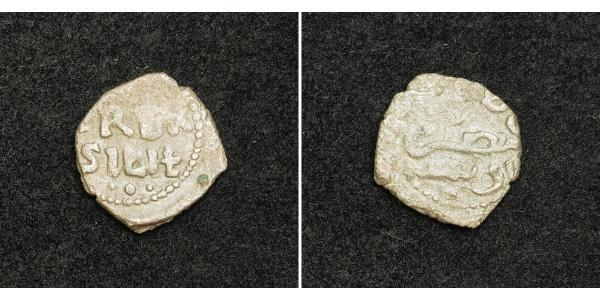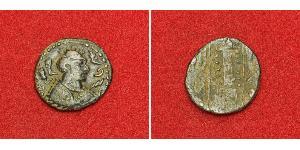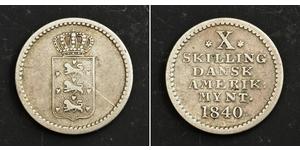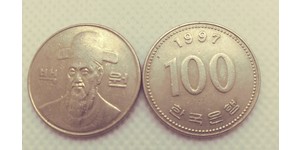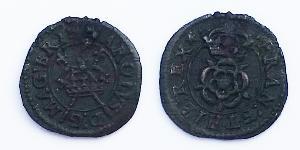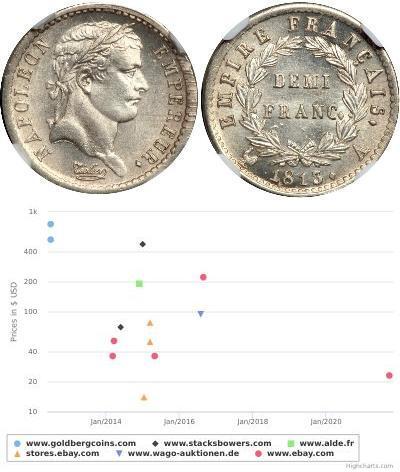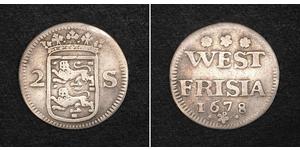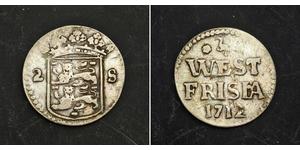(售价 $22.0)
1166, Kingdom of Sicily, Henry VI. Billon Silver Fractional Dirham Coin. VF-
Condition: F-VF
Mint Place: Palermo
Mint Period: 1194-1195
Denomination: Fractional Dirham (or 1/4 Tercenarius)
Reference:: MEC 477-478, Spahr 2 (RR!), Biaggi 1780.
Material: Silver (low purity)
Diameter: 11mm
Weight: 0.49gm
Obverse: Legend (Z/REX/SICIL) above three dots.
Reverse: Arabic legend in Nashki script, (Caesar Augustus).
Henry VI (November 1165 – 28 September 1197) was King of Germany from 1190 to 1197, Holy Roman Emperor from 1191 to 1197 and King of Sicily from 1194 to 1197.
Born in Nijmegen, Henry was the second son of the emperor Frederick I and Beatrix of Burgundy, and was crowned King of the Romans at Bamberg in June 1169, at the age of four. After having taken the reins of the Empire from his father, who had gone on the Crusade, in 1189–1190 he suppressed a revolt by Henry the Lion, former duke of Saxony and Bavaria and relative of Frederick.
Constance of Sicily was betrothed to Henry in 1184, and they were married on 27 January 1186 in Milan. Constance was the sole legitimate heir of William II of Sicily, and, after the latter's death in November 1189, Henry had the opportunity of adding the Sicilian crown to the imperial one, as his father had died crossing the Saleph River in Cilicia, now part of Turkey 10 June 1190.
In April 1191, in Rome, Henry and Constance were crowned Emperor and Empress by Pope Celestine III. The crown of Sicily, however, was harder to gain, as the barons of southern Italy had chosen a grandson of Roger II, Tancred, count of Lecce, as their king. Henry began his work besieging Naples, but he had to return to Germany (where Henry the Lion had revolted again) after his army had been heavily hit by an epidemic.
Constance, who stayed behind in the palace at Salerno, was betrayed by the Salernitans, handed over to Tancred, and only released on the intervention of Celestine III, who in return recognized Tancred as King of Sicily.
Henry had a stroke of fortune when Leopold V, Duke of Austria, gave him his prisoner, king Richard I of England, whom he kept in Trifels Castle. Ignoring his excommunication by Pope Celestine III for imprisoning a former crusader, Henry held Richard for a ransom of 150,000 silver marks. Henry was granted free passage in Northern Italy, signing with the Italian communes a treaty in January 1194. The following April he also reached a settlement with Henry the Lion. In February Tancred died, leaving as heir a young boy, William III.
Henry met little resistance and entered Palermo, capital city of the Kingdom of Sicily, on 20 November, and was crowned on 25 December. He is also said to have had the young William blinded and castrated, while many Sicilian nobles were burned alive. Some, however, like the Siculo-Greek Eugene of Palermo, transitioned into the new Hohenstaufen government with ease.
At that point, Henry was the most powerful monarch in the Mediterranean and Europe, since the Kingdom of Sicily added to his personal and Imperial revenues an income without parallel in Europe. Henry felt strong enough to send home the Pisan and Genoese ships without giving their governments the promised concessions in Southern Italy, and even forced the Byzantine Empire to collect a large tribute, which, however, was not paid before Henry's death. In 1194 his son, Frederick, the future emperor and king of Sicily and Jerusalem, was born. Henry secured his position in Italy, naming his friend Conrad of Urslingen as Duke of Spoleto and giving the Marche to Markward von Annweiler.
His next aim was to make the imperial crown hereditary. At the Diet of Würzburg, held in April 1196, he managed to convince the majority of the princes to vote for his proposal, but in the following one at Erfurt (October 1196) he did not achieve the same favourable result.
In 1197 the tyrannical power of the foreign King in Italy spurred a revolt, especially in southern Sicily, which his German soldiers suppressed mercilessly. In the same year Henry prepared for a Crusade, but, on 28 September, he died of malaria in Messina, although it is also widely believed that he was poisoned.
His son Frederick II was to inherit both the Kingdom of Sicily and the Imperial crown.
Henry was fluent in Latin and, according to Alberic of Troisfontaines, was "distinguished by gifts of knowledge, wreathed in flowers of eloquence, and learned in canon and Roman law". He was a patron of poets and poetry, and he almost certainly composed the song "Kaiser Heinrich", now among the Weingarten Song Manuscripts.
According to his rank and with Imperial Eagle, regalia, and a scroll, he is the first and foremost to be portrayed in the famous Codex Manesse, a fourteenth-century manuscript showing 140 reputed poets (see Minnesänger), and at least three poems are attributed to a young and romantically minded Henry VI. In one of those he describes a romance which makes him forget all his earthly power, and neither riches nor royal dignity can outweigh his yearning for that lady (ê ich mich ir verzige, ich verzige mich ê der krône – before I give her up, I’d rather give up the crown).
2 Stuiver 荷兰 銀
本组有 2 钱币 / 2 售价
⇑

